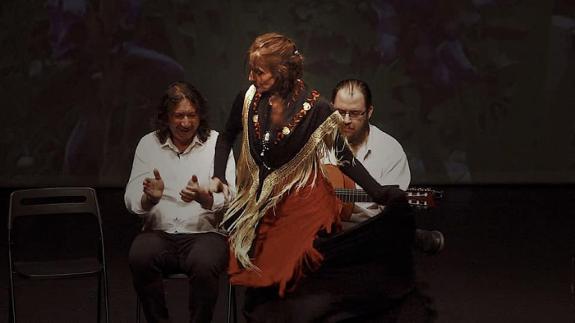

Sections
Highlight

Tony Bryant
Wednesday, 31 March 2021, 18:42
Compartir
The cultural and entertainment business in the province of Malaga, as with the rest of the world, has suffered severely since the coronavirus pandemic struck in March 2020. The lack of tourists over the past 12 months has added further devastation to the entertainment industry, and its effects will prevent many of the venues and clubs from ever reopening again. Some however, like the Kelipé Centro de Arte Flamenco in Malaga, have managed to ride the pandemic, even though the flamenco sector has been one of the most affected. The establishment offers flamenco classes in several languages and it also presents an orthodox Gypsy-style flamenco show at the weekends.
The centre was founded in the Cruz Verde district of Malaga in 2002 and it was the city's first centre dedicated solely to flamenco.
Kelipé was the brain child of Susana Manzano, La Yedra, a Gypsy dancer and singer from Jerez de la Frontera. The name Kelipé comes from the Romany language and signifies fiesta or happiness, but, as Susana points out, "it has a deeper significance than the English translation".
Susana was born in the Gypsy district of Santiago in Jerez de la Frontera, an area that many specialists believe was where the seeds of flamenco singing were first planted in the 18th century. She began dancing as a child during family fiestas and private gatherings. The show she presents at Kelipé, which received rave reviews in the Sunday Times, is based on the traditional family flamenco she experienced as a child. For the past twelve months, the clientele has been mainly Spanish and local residents, but it has been enough to keep the doors open. This is due, according to Susana, to the "quality of the show" and the "expertise of the tutors".
"We have obviously suffered from the restrictions, but in general, we have come out quite well.
"Our show presents the purest styles of song and dance performed by established artistes from Jerez de la Frontera, Malaga, Granada and Extremadura. It is a true reflection of our people and our culture," Susana explains to SUR English.
The centre offers dance, guitar and percussion classes in Spanish, English and French. Obviously, as Susana explains, the most popular courses are for the dance, which attract both male and female students.
"We offer lessons and workshops in several languages. Our guitarist speaks English, and I speak English and French. The problem has been the pandemic, because we are not getting any tourists or foreign students. We are hoping to get back to normal in the summer once the regulations are relaxed," Susana says.
Kelipé presents Flamenco de Ley at 7pm on Thursday, Friday, Saturday and Sunday.
Publicidad
Publicidad
Publicidad
Publicidad
Reporta un error en esta noticia
Necesitas ser suscriptor para poder votar.